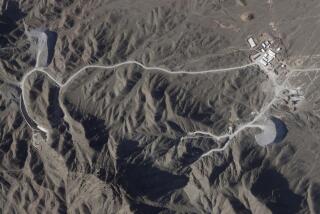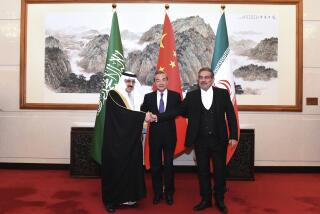Iran’s Khamenei adds a twist to tough terms for nuclear talks
Iran’s supreme leader on Thursday laid out tough terms for negotiations on his country’s nuclear program, saying that all sanctions must be lifted at the start of any agreement and that international inspectors would not be permitted in military sites.
In his first public comments since a framework for a proposed accord was announced April 2, Ayatollah Ali Khamenei emphasized that he is not committed to any deal. He played down the importance of the details released last week.
“There has been nothing done, and there is nothing binding,” Khamenei said in a speech that was televised and distributed on his website.
At the same time, the speech included a surprising, although obscurely worded, line that some U.S. analysts viewed as a signal from Khamenei that a deal on the nuclear issue could open the way to greater cooperation with the United States.
After a section of the speech in which he recounted what he saw as past U.S. misdeeds, Khamenei said that “if the counterpart stops its bad behavior, one could expand this experience to other issues.”
Although hardly a ringing endorsement, the words may indicate a significant shift. In the past, Khamenei had insisted that a nuclear deal would not improve Iran’s overall ties to the U.S. Those statements have been aimed at hard-liners who fear a warming of relations that could jeopardize the ideology of the Islamic Republic.
The speech’s disparate elements — tough talk about terms along with a hint about a wider improvement in relations — led analysts to see it as a signal that Iran’s leader wants the nuclear negotiations to succeed, but also wants to push the Obama administration further on key issues, particularly a rapid easing of sanctions.
Iranian officials have promised the public that the nuclear talks would lead to noticeable improvement in the country’s battered economy, and they are under pressure to deliver.
Iran would not sign any accord “unless all economic sanctions are totally lifted on the first day of the implementation of any deal,” Khamenei insisted.
The Obama administration and the five countries that are its negotiating partners — Britain, China, France, Germany and Russia — are demanding that relief be delayed until at least six months after the Iranians begin implementing the terms of a deal. They also want the sanctions lifted in phases as Iran follows through on its commitments to disable centrifuges, reduce its stockpile of enriched uranium and take other steps.
Khamenei “needs upfront relief to sell the deal in Iran,” said Cliff Kupchan, chairman of the Eurasia Group, a risk assessment consulting firm. The U.S. might be able to meet that need by allowing Iran to quickly begin selling a limited amount of oil or reconnecting some of its banks to the international financial system, he said.
The Iranian leader is holding out an incentive to the administration, saying, “I realize the stakes here: Give me upfront sanctions relief, and the sky’s the limit,” Kupchan added. Khamenei’s remarks “should be viewed more as political jockeying than as setting hard, ‘killer’ red lines.”
Nonetheless, the speech’s tougher portions will almost certainly complicate the political task for President Obama and his aides. They already face strong opposition in Congress, influenced by criticism of the deal from Israeli leaders and nervousness on the part of Saudi Arabia and other Arab countries that have been U.S. allies.
The speech immediately raised concern in the U.S. about how many elements of the deal Khamenei may try to walk back during the negotiations leading up to the June 30 deadline for a final agreement.
In the speech, Khamenei also criticized the Saudis in uncharacteristically harsh terms for their 2-week-old military offensive against Iran-backed Houthi insurgents in Yemen. He described the Saudi government under newly installed King Salman as “inexperienced youngsters” who had replaced their predecessors’ restraint with “barbarism.”
The nuclear negotiations are aimed at ensuring that Iran is not able to build an atomic weapon within the expected 10- to 15-year duration of the pact.
The bargaining involves an Iranian nuclear program that includes 19,000 centrifuges at two enrichment sites, the underground Fordow installation and the larger Natanz center. Iran also has a partially built heavy-water reactor at Arak, uranium mines and several research centers, some facilities dating back to before the Islamic Republic came into being in 1979.
Iran is believed to have spent $100 billion over decades on its nuclear infrastructure. The government considers it a national treasure and even reformist leaders want it preserved.
Inspections of military sites, the second issue Khamenei raised, is politically sensitive in both countries. In the U.S., opponents of the talks insist Iran will try to cheat on any deal. Yet the Iranians are reluctant to allow inspections in their military bases because they fear the inspections are aimed in part at snooping on the capabilities of their armed forces.
The Iranian Revolutionary Guard Corps has been strongly opposed to opening up its bases, and Khamenei’s words may indicate that he is weighing in on its side.
The six world powers consider access to the bases crucial because some, such as the Parchin complex, may hold the key to whether Iran has sought to develop nuclear weapons. Other installations on military bases, such as the Fordow site, are central to Iran’s nuclear program.
Khamenei’s unwillingness to commit to a deal is consistent with the position he has taken since the talks began in earnest 18 months ago. He has emphasized that he supports the negotiations, yet has positioned himself so he can distance himself from the deal if it proves flawed or unpopular.
As he has before, Khamenei said he doesn’t trust U.S. officials and was “never very optimistic” that the negotiations would result in a deal.
He called U.S. public statements about the deal “flawed, incorrect and in contradiction to the facts.” And he expressed strong contempt for the U.S., describing it as “stubborn, deceitful, indecent and given to backstabbing.”
Some analysts took Khamenei’s comments as a danger sign for the talks. Others contended that Khamenei was again laying down tough terms in hope of helping Iranian negotiators in the bargaining.
Khamenei “knows very well that sanctions won’t be lifted immediately,” said Alireza Nader, an Iran specialist at Rand Corp. “There’s a middle ground here and he’s trying to push the negotiations toward it.”
Special correspondent Mostaghim reported from Tehran and Times staff writer Richter from Washington.
Twitter: @richtpau
More to Read
Start your day right
Sign up for Essential California for news, features and recommendations from the L.A. Times and beyond in your inbox six days a week.
You may occasionally receive promotional content from the Los Angeles Times.







